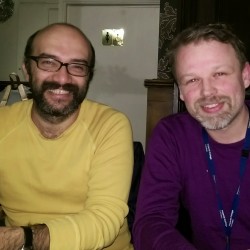
Vahid Shahrezaei from the Mathematics department at Imperial College and Sam Marguerat from the CSC’s Quantitative Gene Expression Group will be leading the £250,173 award to investigate noise in gene expression using single cells.
The collaboration will unite Marguerat’s experimental skills with Shahrezaei’s theoretical knowledge in order to gain insight into the process of stochastic gene expression and protein noise, which describes the fluctuating number of molecules inside cells that causes seemingly identical cells to behave differently.
Both investigators are particularly interested in noise in protein levels generated when the cell divides – called partitioning noise – that can lead to an uneven distribution of proteins as the cell splits, a source of variability passed on from one generation to the next.
The award will support a senior researcher for three-years who will work embedded in both laboratories. The idea is to measure protein noise in live cells using advanced imaging techniques at the CSC, and to analyse and model these data at the Imperial College’s mathematics department.
“We are delighted to have been given the opportunity by the Leverhulme Trust to pursue this interdisciplinary project,” says Marguerat. “The sort of questions we are asking here can only be successfully understood through a synergy of experimentalists and theoreticians.”
“This proposal was born when a biologist and a mathematician, interested in the same scientific questions, sat together at a table to figure out how to best tackle them. We are very excited to have been given the opportunity by the Trust to bring this project to life,” he adds.
Marguerat hopes this will take the collaboration between the Quantitative Gene Expression Group and Imperial’s Department of Mathematics to a new level, in line with the CSC’s Integrative Biology section’s mission to foster research that integrate experimental, computational and theoretical approaches.
The Leverhulme Trust was established by the Will of William Hesketh Lever, the founder of Lever Brothers. Since 1925 the Trust has provided grants and scholarships for research and education; today it is one of the largest all-subject providers of research funding in the UK, distributing over £60 million a year. For more information, visit www.leverhulme.ac.uk
